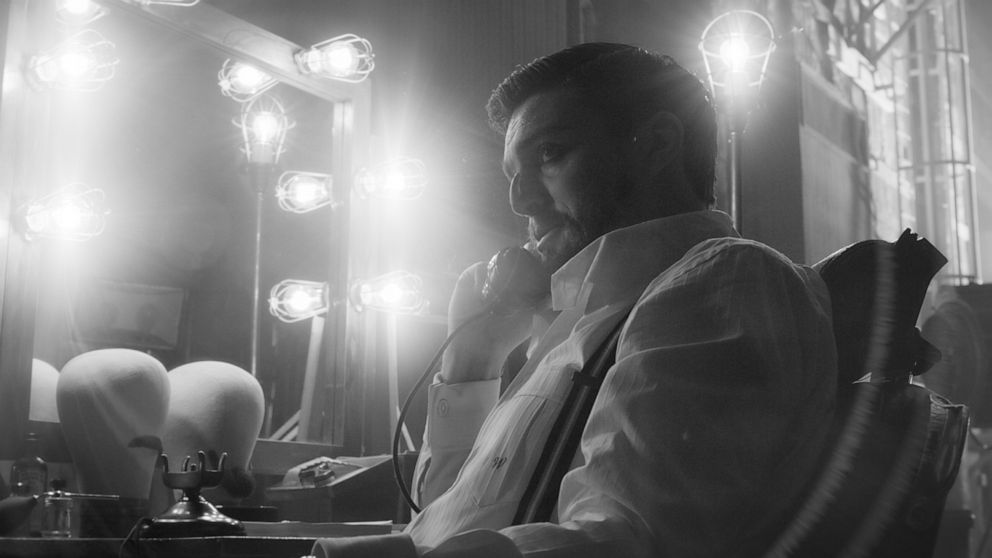Mank is a phenomenal piece of cinema, but it is not a very entertaining movie. What David Fincher has achieved is a sweeping parlor trick that satirizes the majesty of Hollywood’s Golden Age, captured at a moment when the industry was clawing its way out of the Great Depression. The film’s production and its cinematography are nothing short of exquisite, and they immerse themselves within that era almost seamlessly. Light and shadow; black and white. What’s more? Mank is so full of lyrical wordplay that certain sequences feel as if they are about to burst into song. A half-hour in, a young John Houseman, who is being portrayed here by Sam Troughton, refers to some of Herman Mankiewicz’s early attempts at writing dialogue for Citizen Kane as “a bit of a jumble; a hodgepodge of talkie episodes; a collection of fragments that leap around in time like Mexican jumping beans.” Consider this a wink of the eye, a wry acknowledgment, if you will, that Mank’s frenetic timeline is a direct homage to some of the screenplay’s original source material. What David Fincher seems to be aspiring toward here is not so much a biopic as it is an “impressionistic portrait” (Thank you, Aaron Sorkin.), a retrospective collage that is similar in structure to Bob Fosse’s All that Jazz, and similar in tone to Federico Fellini’s 8 ½. Mank might also be compared to some of the Coen Brothers’ period pieces, with the key difference being that Fincher’s picture never seems to push beyond the theatrical limits of its devices, married as it is to the conceit of
1930s charm.
At its core, Mank does not presume to definitively settle the 80-year-old argument over who wrote what (and how much) of the Citizen Kane screenplay, although the arc appears to favor Mankiewicz as the workman poet. What is at stake on a broader scale is recognition for the never-ending parade of lesser-known artists who have either been abused by the Hollywood system, or who have been deprived of any due credit for their cause. To that end, it bears noting that David Fincher’s late father, Jack, authored the original screenplay for Mank. The elder Fincher, who died of cancer in 2003, was a successful journalist who spent at least some of his career as the San Francisco Bureau Chief for Life Magazine. The younger Fincher, whose films have grossed well over $2 billion, spent more than 20 years attempting to get his father’s screenplay greenlighted. Such is Hollywood, a tentpole circus. But there is a meta aspect to the affair, a sympathetic hook to the lifelong travails of a beloved screenwriter with A-list connections who somehow never gets to see his name
appear in lights.

Herman Mankiewicz died in 1953, more than a decade after Citizen Kane was released, and 18 years before vaunted film critic Pauline Kael would champion Mankiewicz as the film’s main driving force. Kael’s 50,000-word essay, entitled “Raising Kane,” appeared in The New Yorker several months prior to it being published in The Citizen Kane Book. One year later in 1972, award-winning director—and Orson Welles apologist—Peter Bogdanovich wrote a scathing indictment of Kael’s essay and her journalistic ethics by way of an Esquire exposé entitled “The Kane Mutiny.” “What Kael produced is so loaded with error and faulty supposition,” Bogdanovich insisted, “that it would require at least as many words as were at her disposal to correct, disprove, and properly refute it.” Kael’s essay has since been discredited, whereas Bogdanovich has admitted that Orson Welles played a significant role in helping to finetune his response. According to A Life in The Dark—a Kael biography—the embattled film critic had discussed her discontent over Bogdanovich’s exposé with Woody Allen shortly after reading it for the first time. Although it might seem unlikely that Kael and Allen would be close friends, the reality is that Woody Allen was only one of several Kael associates who would eventually go on to achieve next-level stardom. Consider that in relation to Herman Mankiewicz, who was The New Yorker’s original theatre critic. Consider that in relation to Mankiewicz and Welles. Consider that in relation to Mankiewicz and William Randolph Hearst, along with William Randolph Hearst’s immediate circle.
Better yet, consider a scene from Mank during which MGM co-founder Louis B. Mayer—upon encountering a surly Mankiewicz—asks producer Irving Thalberg, “Who was that again?” “Just a writer,” Thalberg responds. That tells the story, not only of Mankiewicz but, maybe to some extent, of Pauline Kael, as well. There are bylines in this world and there are billboards. Gary Oldman will be appearing as Herman Mankiewicz on several billboards over the next five months. Keep an eye out for him. Best Actor: For Your Consideration Throughout 2021.
(Mank arrives on Netflix this coming Friday, December 4th.)



